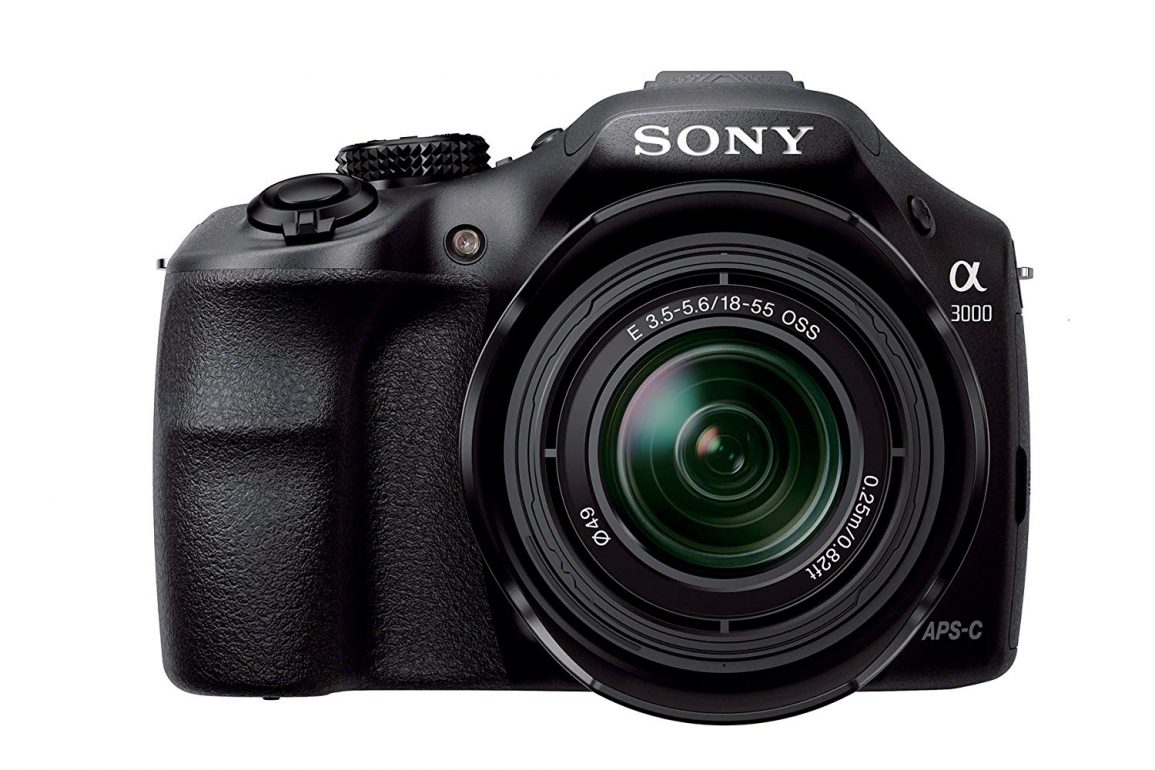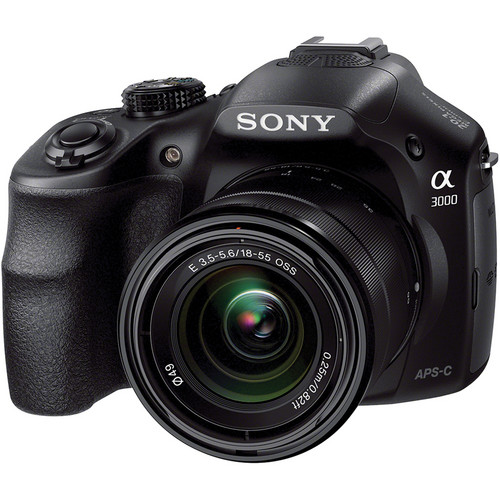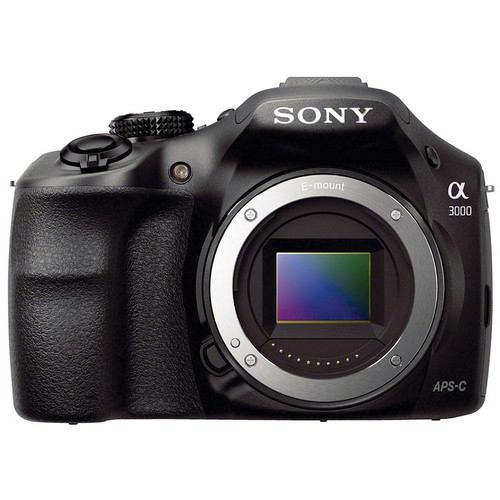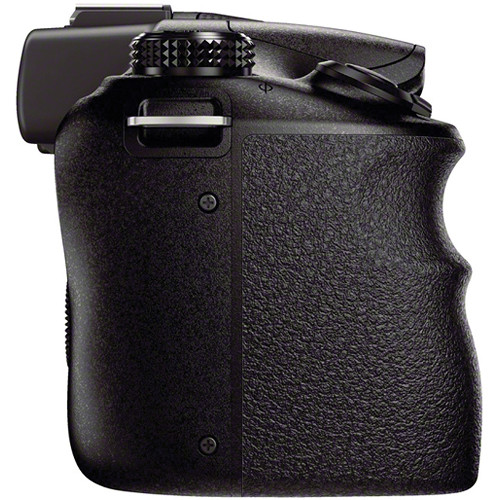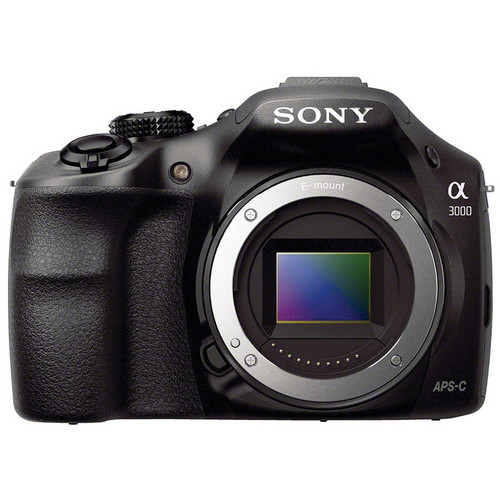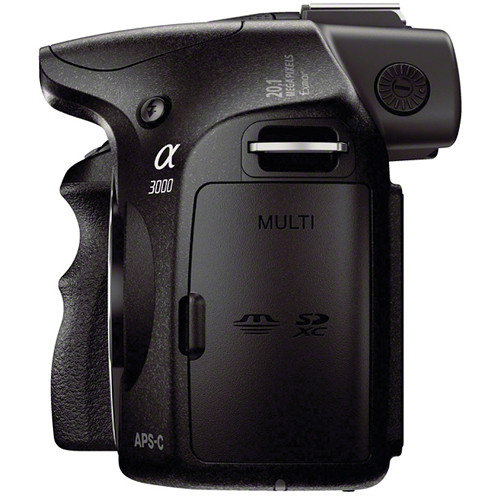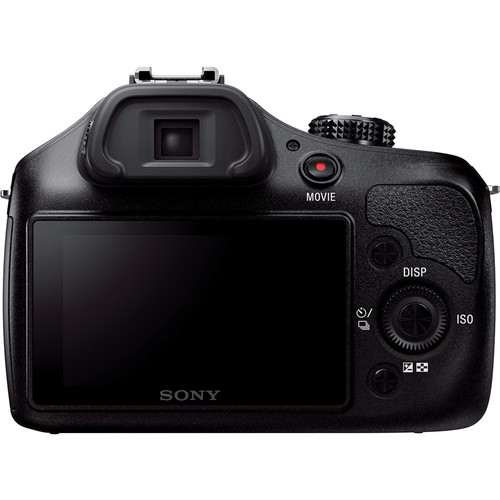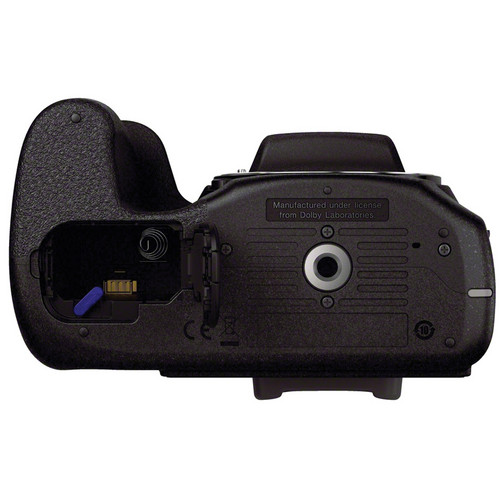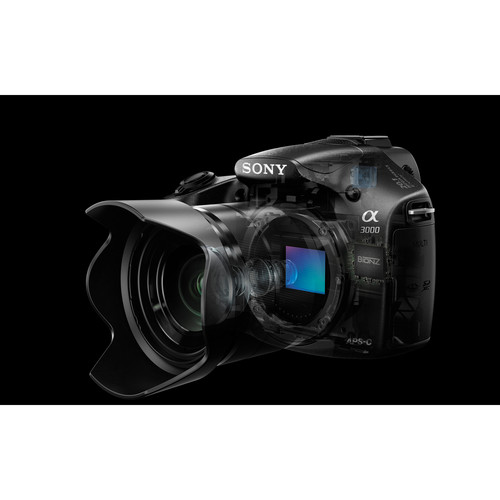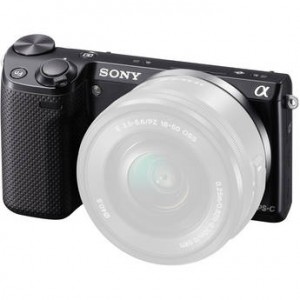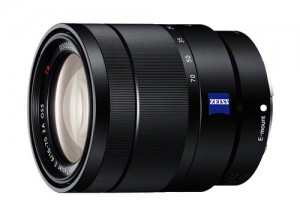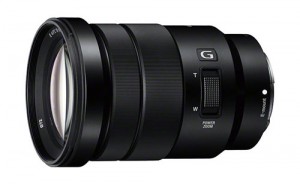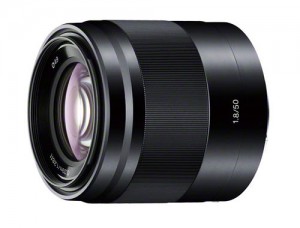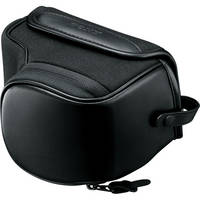Sony finally announced their new gear after weeks of rumors and speculation! Two new digital cameras as well as three new E-Mount lenses plus a new soft carry case designed for NEX cameras. The new cameras are the Alpha A3000 DSLR Camera and the Alpha NEX-5T Mirrorless Digital Camera. The lenses are the new Vario-Tessar T* E-mount 16-70mm f/4 ZA OSS lens, the E-mount PZ 18-105 f/4 G OSS lens, and the E-mount 50mm f/1.8 Mid-Range Prime lens, which is a black version of a lens that already exists in silver finish.
Sony ILC-A3000 DSLR Style Camera
As it turns out, the entry-level ILC-A3000 is designed for E-Mount lenses and is priced at only $398 US. This makes sense to me, because we have enough E-Mount lenses to justify another camera option like this for those who want this style camera. Plus, most of the lenses have OSS, so the cost can be kept really low for this camera body not having in camera stabilization, and it will be very light weight. Very smart move in my opinion for beginners looking for a very small DSLR with killer Sony image quality and a solid affordable lens E-Mount Lens line-up. Will see if it actually sells to the masses though ;)The 18-55mm kit lens is included!
20.1MP Exmor APS HD CMOS Sensor and BIONZ Image Processor
The 20.1MP APS-C-sized Exmor APS HD CMOS sensor and BIONZ image processor work together to produce high resolution, well-detailed imagery with minimal noise and notable low-light quality and sensitivity from ISO 100-16000. The adaptive noise reduction technology is the same that is used in Sony’s flagship DSLR, which works to intelligently reduce noise at higher sensitivities. The processor also contributes to providing a wealth of speed throughout the camera system, including quick autofocus in live view, top full-resolution continuous shooting rate of 3.5 fps, and full HD 1080i/p video recording in multiple frame rates.
Lightweight Design and SLR Form-Factor
A large, ergonomic grip is integrated into the compact overall form-factor of the body, giving an appearance that resembles a traditional SLR but with a smaller, lighter weight design reminiscent of mirrorless cameras. This added grip works to increase shooting and carrying stability and security. The design of the A3000 also incorporates both a 3.0″ 230.4k-dot rear LCD monitor and a Tru-Finder electronic eye-level viewfinder. The 0.5″ EVF features a QVGA resolution and 100% frame coverage in addition to serving as a third point of contact between yourself and the camera for greater shooting stability. Additionally, a Multi Interface accessory shoe is available for attaching an external flash, microphone, or other accessories. A Multi Terminal is available, too, for using an optional remote control.
Full HD Video Recording
Full HD 1080i/p video recording is supported at both 60 and 24 fps frame rates to produce high resolution movies with a smooth, cinematic look. Videos are recorded using the high-quality AVCHD codec and a built-in stereo microphone records sound in the Dolby Digital AC-3 format. Additionally, 1440 x 1080p and 640 x 480p at 30 fps formats are also supported in the Internet-friendly MP4 format.
Sony 18-55mm f/3.5-5.6 Standard Zoom Lens
The included 18-55mm f/3.5-5.6 Standard Zoom Lens provides a 35mm-equivalent focal length range of 27-82.5mm, covering wide-angle to portrait-length perspectives to suit shooting in a wide variety of situations. It features Optical SteadyShot image stabilization to help minimize the appearance of camera shake by up to four shutter speed steps to greatly benefit working in low-light conditions and with greater zoom magnifications. Three aspherical elements are integrated into the optical construction to help reduce chromatic aberrations as well as increase clarity and contrast and an internal focusing mechanism works to provide smooth, responsive AF that pairs well with HD video recording.
Other Camera Features
Auto Object Framing is an intelligent shooting mode that can automatically analyze the scene and subjects within it and determine an aesthetically-pleasing composition. The subsequent imagery will be cropped according to subject matter, resulting in a well-balanced composition that utilizes Face Detection and Tracking Focus to ensure high image quality and sharpness.
Auto HDR mode will automatically record a bracketed range of exposures of the same scene in order to capture greater highlight and shadow detail than a single exposure can record. These multiple exposures will then be composited into a single file that exhibits an extended dynamic range.
Face Detection/Registration technology can detect and register up to eight individual faces and adjust the focus, exposure, white balance, and flash settings in order to deliver optimal image settings for pictures of people. Children or adults can be prioritized within this mode.
Picture Effect modes allow you to apply creative settings and emphasize certain facets of individual images for a richer, more aesthetic picture quality. Posterization (Color/B&W), Pop Color, Retro Photo, Partial Color (R/G/B/Y), High Contrast Mono, Toy Camera, Soft High-Key, Soft Focus, HDR Painting, Rich-Tone Mono, and Miniature modes are available.
Clear Image Zoom can be used to magnify the center of scenes by 2x to effectively extend the reach of any focal length lens. This digital zoom technology uses an intelligent interpolation process to minimize the amount of image degradation in order to produce realistic, high-quality images.
Creative Style settings provide control over how the camera processes images based on six different predetermined styles: Standard, Vivid, Portrait, Landscape, Sunset, and B&W. Within these settings, contrast, saturation, and sharpness can also be adjusted depending on personal preference.
Sweep Panorama technology allows you to automatically capture wide, expansive panoramic images, up to 202°, by simply panning about the scene. Images can be made in either vertical or horizontal orientation and the camera will intelligently stitch together the consecutive images into one file up to 23MP in size.
Dynamic Range Optimizer (DRO) works to improve images featuring backlit subjects or scenes with high contrast where details can be lost in the shadows or highlights. This mode can be controlled automatically or fine-tuned using five settings.
The Photo Creativity Touch Interface provides a wealth of controls for modifying the look of imagery in-camera. Changes can be made using the intuitive control dial and results are seen in real time on the LCD monitor. Background Defocus, Brightness, Color, Vividness, and most Picture Effects can be manipulated in this manner.
The Sony E-mount affords compatibility with an extensive number of lenses and lens adapters.
Convenient USB charging allows you to charge the included lithium-ion battery in-camera via USB connection from either an AC outlet or PC source.
The Stamina battery power allows up to approximately 470 shots to be taken on a single charge. The InfoLITHIUM batteries also enable you to see the remaining percentage of battery power left.
TRILUMINOS Color support is afforded by the A3000 to produce rich, natural colors when imagery is viewed on a TRILUMINOS Display.
| Lens Mount | Sony E-mount |
| Sensor Type | Exmor APS HD CMOS sensor |
| Sensor Size | 23.5 x 15.6mm (APS-C) |
| Processor | BIONZ image processor |
| Anti-Dust Coating | Charge protection coating on Optical Low-Pass Filter |
| Actual Pixels | 20.4MP |
| Effective Pixels | 20.1MP |
| Focal Length Conversion Factor |
1.5x |
| Color Filter System | RGB primary color filters |
| Media Type | Memory Stick PRO Duo, Pro-HG Duo, SD, SDHC, SDXC Memory Cards |
| Color Space | Stills: sRGB, AdobeRGB Movie: xvYCC standard compatible with TRILUMINOS Color |
| Still Image Mode | JPEG (Standard, Fine), RAW+JPEG |
| Still Image Size | 3:2 – (20 MP) 5456 x 3632, (10 MP) 3872 x 2576, (5 MP) 2736 x 1824 16:9 – (17 MP) 5456 x 3064, (12 MP) 3872 x 2176, (4.2 MP) 2736 x 1824 |
| Panorama Still Image Size | Horizontal Wide: 12416 x 1856 (23M) Horizontal Std.: 8192 x 1856 (15M) Vertical Wide: 2160 x 5536 (12M) Vertical Std.: 2160 x 3872 (8.4M) |
| Video Mode | AVCHD / MP4 (MPEG-4 AVC (H.264)) |
| Video Resolution | AVCHD: FX – 1920 x 1080/60i@24Mbps FH – 1920 x 1080/60i@17Mbps FX – 1920 x 1080/24p@24Mbps FH – 1920 x 1080/24p@17Mbps MP4: HD – 1440 x 1080/ 30p@12Mbps VGA – 640 x 480/ 30p@3Mbps |
| Video Signal | NTSC color, EIA standards |
| Audio Format | Dolby Digital (AC-3) / MPEG-4 AAC-LC |
| Microphone/Speaker | Built-in Stereo Microphone/ Built-in monaural speaker |
| Still Image File Format | JPEG (DCF Ver. 2.0, Exif Ver.2.3, MPF Baseline compliant), RAW (Sony ARW 2.3 format) |
| Viewfinder Type | 1/2-inch (1.3 cm) color electronic viewfinder |
| Diopter Adjustment | -4.0 m-1 ~ +3.5 m-1 (diopter) |
| Field of View | 100% |
| Magnification | 0.7x with 50mm lens at infinity, -1 m-1 (diopter) |
| LCD Type | 3.0” (7.5 cm) TFT LCD (230,400 dots) |
| Coverage | 100% |
| Focus System | Contrast-detect AF |
| Focus Points | 25 points (contrast-detection AF) |
| AF Modes | Single-shot AF(AF-S), Continuous AF(AF-C), Auto Focus, Direct Manual Focus (DMF), Manual |
| Focus Area | Multi Point (25 points)/ Center-weighted/ Flexible Spot |
| Focus Sensitivity | EV 0 to 20 EV (at ISO100 equivalent, with f/2.8 lens attached) |
| AF Illuminator | Yes (with built-in LED type) |
| Exposure Metering | 1,200-zone evaluative metering |
| Metering Modes | Multi-segment, Center-weighted, Spot |
| Metering Sensitivity | EV 0 to 20 EV (at ISO100 equivalent, with f/2.8 lens |
| Exposure Compensation | Still images: +/-3.0 EV(1/3EV steps selectable) Movies: +/-2.0 EV(1/3EV steps selectable) |
| Exposure Settings | iAUTO, Superior Auto, Programmed AE (P), Aperture priority (A), Shutter-speed priority (S), Manual (M), Sweep Panorama, Scene Selection |
| Color Temperature | 2500 – 9900K with 15-step each Magenta/Green compensation (G7 to M7), Amber/Blue (A7 to B7), Custom |
| Exposure Bracketing | 3 continuous or single shots in 1/3 or 2/3 EV steps |
| ISO | Stills: ISO 100-16000 selectable in 1 EV steps, Auto (100-3200) Movies: ISO 100-3200 selectable in 1 EV steps, Auto (200-3200) |
| White Balance Mode | Auto, Daylight, Shade, Cloudy, Incandescent, Fluorescent, Flash, Color, temperature range 2500 to 9900K, Custom |
| Burst Buffer | JPEG Standard (30 shots); JPEG Fine (13 shots); RAW+JPEG (5 shots) |
| Continuous Shooting Speed | Continuous mode: 2.5 fps, Speed Priority Continuous mode: 3.5 fps |
| Drive Mode | Single-shot, Continuous, Speed Priority Continuous, Bracketing |
| Self-Timer | 10- or 2-sec. delay; Continuous w/ 10-sec. delay, 3 or 5 exposures |
| Shutter Speeds | 1/4000 to 30 seconds, bulb |
| Shutter Type | Electronically controlled, vertical-traverse, focal-plane shutter |
| Flash Type | Built-in, Pop-up Auto |
| Guide Number | 13.1′ (4 m) at ISO100 |
| Flash Metering System | Pre-flash TTL |
| Flash Modes | Flash off, Auto flash, Fill-flash, Slow Sync., Rear Sync. |
| Flash Compensation | +/-2.0 EV (switchable between 1/3 EV steps) |
| Flash Coverage | 16mm |
| Flash Bracketing | +/-2.0 EV |
| Recycling Time | Approx. 3 sec. |
| Accessory Shoe | Yes, via Multi Interface Shoe |
| HDMI Terminal | HDMI (Type C mini) |
| Memory Card Slot | Dual compatibility slot |
| NFC | Yes (NFC Forum Type 3 Tag compatible) |
| PhotoTV HD | Yes, with BRAVIA Sync enabled HDTV and HDMI cable |
| Tripod Mount | Yes, 1/4″-20 |
| USB Port | USB 2.0 Hi-speed (mass-storage, MTP) |
| Wi-Fi | Yes |
| Dimensions | 4.0 x 2.3 x 1.5″ (101.6 x 58.1 x 38.3mm) |
| Weight (body only) | 7.8 oz (222 g) |
Sony ILC-A3000 Sample Photos and Early Reviews/ Impressions
- Hands-On First Impressions @ Pocket-Lint >>
- First Impressions @ ThePhotoblographer >>
- Hands-On Preview @ ePhotozine >>
- Hands-On Video @ Engadget >>
- Sample Photos @ Dyxum Forums >>
Sony Nex-5T Mirrorless ILC Camera
The Sony Nex-5T looks like it’s only a minor upgraded Nex-5r? Not sure why Sony came out with this camera as it seems to contradict the strategy of only coming out with significantly upgraded and or advanced improvements?? The NFC I guess made it worth the upgrade in Sony’s mind, or they did some changes inside to justify discontinuing the Nex-5r. That makes sense I guess, but still seems odd to me honestly.
Key Features:
- 16.1MP APS-C Exmor APS HD CMOS Sensor
- BIONZ Image Processor
- 3.0″ 921.6k-Dot Tilting Touchscreen LCD
- Full HD 1080i/p Video at 60 or 24 fps
- Fast Hybrid AF
- Built-In Wi-Fi and NFC Connectivity
- Continuous Shooting Rate of 10 fps
- ISO 100-25600
- Auto Object Framing and Auto HDR Modes
- Picture Effect Mode and Sweep Panorama
| Lens Mount | Sony E-mount |
| Sensor Type | Exmor APS HD CMOS sensor |
| Sensor Size | 23.5 X 15.6mm (APS-C) |
| Processor | BIONZ image processor |
| Actual Pixels | 16.1MP |
| Effective Pixels | 16.1MP |
| Focal Length Conversion Factor | 1.5x |
| Color Filter System | RGB primary color filters |
| Media Type | Memory Stick PRO Duo, Pro-HG Duo, SD, SDHC, SDXC Memory Cards |
| Color Space | Stills: sRGB, AdobeRGB Movie: xvYCC standard compatible with TRILUMINOS Color |
| Still Image Mode | JPEG (Standard, Fine), RAW+JPEG |
| Still Image Size | 3:2 – L: 4912 x 3264 (16MP), M: 3568 x 2368 (8.4MP) , S: 2448 x 1624 (4MP) 16:9 – L: 4912 x 2760 (7.1MP), M:3568 x 2000(7.1MP), S: 2448 x 1376 (3.4MP) |
| Panorama Still Image Size | Horizontal Wide: 12416 x 1856 (23M) Horizontal Std.: 8192 x 1856 (15M) Vertical Wide: 2160 x 5536 (12M) Vertical Std.: 2160 x 3872 (8.4M) |
| Video Mode | AVCHD / MP4 (MPEG-4 AVC (H.264)) |
| Video Resolution | AVCHD: PS – 1920 x 1080/ 60p @ 28Mbps FX – 1920 x 1080/ 60i @ 24Mbps FH – 1920 x 1080/ 60i @ 17Mbps FX – 1920 x 1080/ 24p @ 24Mbps FH – 1920 x 1080/ 24p @ 17Mbps MP4: HD: 1440 x 1080/30p @12Mbps VGA – 640 x 480/ 30p @ 3Mbps |
| Video Signal | NTSC color, EIA standards |
| Audio Format | Dolby Digital (AC-3) / MPEG-4 AAC-LC |
| Microphone/Speaker | Built-in Stereo Microphone/ Built-in monaural speaker; volume settings in 8 steps |
| Still Image File Format | JPEG (DCF Ver. 2.0, Exif Ver.2.3, MPF Baseline compliant), RAW (Sony ARW 2.3 format) |
| LCD Type | 3.0” (7.5 cm) Touchscreen TFT LCD (921,600 dots) |
| Angle Adjustment | Tilt angle: Up: 180°; Down: Approx. 50° |
| Brightness Control | Auto, Manual (5 steps between -2 to +2) |
| Coverage | 100% |
| Focus System | Fast Hybrid AF (phase-detection AF/contrast-detection AF) |
| Focus Points | 99 points (phase-detection AF), 25 points (contrast-detection AF) |
| AF Modes | Single-shot AF(AF-S), Continuous AF(AF-C), Autofocus, Direct Manual Focus (DMF), Manual Focus |
| Focus Area | Multi Point AF (99 points for phase-detection AF, 25 points for contrast-detection AF), Center-weighted, Flexible, Spot |
| Focus Sensitivity | EV 0 to 20 EV (at ISO100 equivalent, with f/2.8 lens attached) |
| AF Illuminator | Yes (with built-in LED type) |
| Exposure Metering | Advanced 1200-zone evaluative metering |
| Metering Modes | Multi-segment, Center-weighted, Spot |
| Metering Sensitivity | EV 0 to 20 EV (at ISO100 equivalent, with f/2.8 lens attached) |
| Exposure Compensation | Still images: +/-3.0 EV(1/3EV steps selectable) Movies: +/-2.0 EV(1/3EV steps selectable) |
| Exposure Settings | iAUTO, Superior Auto, Programmed AE(P), Aperture Priority (A), Shutter Speed (S), Manual (M), Sweep Panorama, Scene Selection |
| Color Temperature | 2500 – 9900K with 15-step each Magenta/Green compensation (G7 to M7), Amber/Blue (A7 to B7), Custom |
| Exposure Bracketing | 3 continuous or single shots in 1/3 or 2/3 EV steps |
| ISO | Stills: ISO 100-25600 selectable in 1 EV steps, Auto (100-3200) Movies: ISO 100-6400 selectable in 1 EV steps, Auto (100-3200) |
| White Balance Mode | Auto, Daylight, Shade, Cloudy, Incandescent, Fluorescent, Flash, Color, temperature range 2500 to 9900K, Custom |
| Burst Buffer | JPEG Standard (11 shots), JPEG Fine (11 shots), RAW (10 shots), RAW+JPEG (9 shots) |
| Continuous Shooting Speed | Speed Priority Continuous mode: 10 fps |
| Drive Mode | Single-shot, Continuous, Speed Priority Continuous, Bracketing |
| Self-Timer | 10- or 2-sec. delay; Continuous w/ 10-sec. delay, 3 or 5 exposures |
| Shutter Speeds | Still images: 1/4000 to 30 seconds, Bulb; Movies: 1/4000 to 1/4 (1/3 steps), Up to 1/60 in AUTO mode (up to 1/30 in Auto slow shutter mode) |
| Shutter Type | Electronically controlled, vertical-traverse, focal-plane shutter |
| Guide Number | 23′ (7 m) at ISO100 |
| Flash Metering System | Pre-flash TTL |
| Flash Modes | Flash off, Auto flash, Fill-flash, Slow Sync., Rear Sync., Red-eye reduction (on/off selectable) |
| Flash Compensation | +/-2.0 EV (switchable between 1/3 EV steps) |
| Flash Coverage | 16mm |
| Flash Bracketing | +/-2.0 EV |
| Recycling Time | Approx. 4 sec. |
| Accessory Shoe | Smart Accessory Terminal2 |
| Wi-Fi | Yes |
Sony Nex-5T – Sample Ph0tos and Early Reviews/ Impressions
- Hands-On First Impressions @ Pocket-Lint >>
- First Impressions @ ThePhotoblographer >>
- Hands-On Preview @ ePhotozine >>
- Hands-On Video @ Engadget >>
- Hands-On @ TechRadar >>
- Hands-On @ Imaging-Recource >>
Zeiss Vario-Tessar T* E 16-70mm f/4 ZA OSS lens
Next we have the new Zeiss 16-70mm f/4 OSS lens. This is awesome and I want one!! It is slower than ideal at f/4, but you know how big and heavy it would need to be for f/2.8. This design is ultra compact and super high quality optics. Plus the sensor is so large on the Sony Nex cameras you can still get nice separation at f/4 if your close to your subject. If you want really fast glass, the best way to go is old school manual focus lenses and adapters. Check out this article for more details on that >>
The Sony Vario-Tessar T* E 16-70mm f/4 ZA OSS Lens is a mid-range zoom lens that provides a 35mm-equivalent focal length range of 24-105mm, covering wide-angle to short telephoto perspectives. A constant f/4 maximum aperture offers consistent performance throughout the zoom range and is especially beneficial when working with greater zoom magnifications in low-light conditions. Also benefiting working in dim light or at the long end of the zoom range is Optical SteadyShot image stabilization, which serves to minimize the appearance of camera shake by up to four shutter speed steps.
- The optical construction incorporates four aspherical elements to help reduce chromatic aberrations throughout the zoom range as well as contribute to a compact overall form-factor. A Carl Zeiss T* anti-reflective coating has been applied to the lens elements to minimize lens flare and ghosting while providing enhanced contrast, clarity, and color fidelity.
- Mid-range zoom lens provides a 35mm-equivalent focal length range of 24-105mm, covering wide-angle to short telephoto perspectives.
- Constant f/4 maximum aperture enables greater consistency throughout the zoom range and benefits working in dim conditions with longer focal lengths.
- Optical SteadyShot image stabilization works to minimize the appearance of camera shake by up to four shutter speed steps to benefit shooting handheld in dim lighting and with greater zoom magnifications.
- Four aspherical elements helps to reduce chromatic aberrations throughout the zoom range while also maintaining a compact form-factor.
- Carl Zeiss T* anti-reflective coating enhances contrast, clarity, and color reproduction by countering the effects of lens flare and ghosting.
- Metal lens barrel increases durability and adds a refined aesthetic appearance.
| Mount | E-mount |
| Focal Length | APS-C: 16-70mm (35mm equivalent: 24-105mm) |
| Aperture Range | f/4-22 |
| Minimum Focus Distance | 1.2′ (35 cm) |
| Magnification | 0.23x |
| Lens Groups/Elements | 12/16 |
| Aspheric Elements | 4 |
| Filter Diameter | 55mm |
| Dimensions | 2.6 x 3.0″ (66.6 x 75mm) |
| Weight | 10.9 oz (308 g) |
Sony E-mount PZ 18-105 f/4 G OSS lens
The E-mount PZ 18-105mm f/4 G OSS lens is the first Sony G lens made for the E-mount camera systems. The G lens series brings with it a tradition of quality that in the case of this 18-105mm includes two ED glass elements and three aspherical elements for reduced distortion and aberrations and high resolution and contrast throughout the zoom range. A circular aperture design enables pleasing out-of-focus areas within the frame.
| Mount | E-mount |
| Focal Length | APS-C: 18-105mm (35mm equivalent: 27-158mm) |
| Aperture Range | f/4-22 |
| Minimum Focus Distance | 1.5′ (45 cm) (W); 3.1′ (95 cm) (T) |
| Magnification | 0.11x |
| Aspheric Elements | 3 |
| ED Elements | 2 |
| Filter Diameter | 72mm |
| Dimensions | 3.1 x 4.3″ (78 x 110mm) |
| Weight | 1.1 lb (482 g) |
Sony E-Mount 50mm f/1.8 OSS Lens (Black)
The E-mount 50mm f/1.8 OSS lens is being introduced as a new color for an existing lens. This model has a black finish but the same specs as its silver version. My review of the sel50f18 lens is Click Here >>
The sel50f18 has a 35mm equivalent focal length of 75mm, ideal for portraiture but certainly capable of shooting in varied situations. This bright f/1.8 aperture is very effective in low light and is able to create shallow depth of field, which is, again, ideal for portraiture but also for still life and numerous other applications. Optical Image Stabilization increases its ability to be blur free when shooting in low light, and its stepping motor means that autofocus operation is smooth and quiet. It also provides Direct Manual Focus for precise manual focus even in AF mode.
New Sony Soft Case
Lastly, Sony has announced a new, black Soft Carry Case that is made to fit snugly on all NEX cameras—and expand if you add longer lenses. The case attaches to the camera via a thumb screw, remaining around the camera while you shoot, which helps to maintain a comfortable grip as well as protect the camera. A simple snap opens to allow shooting, and a strap hook makes it easy to remove the case to change the battery or media card. A pocket is also provided to store memory cards.
Closing Remarks:
Well the ILC-A300o sounds interesting and is incredible affordable with a kit lens included! The best image quality for the money out there is pretty much?
The Nex-5T looks like a wasted upgrade from the Nex-5r unless I’m missing something?
I will get my hands on all this stuff as soon as possible! In the meantime, check out the Samsung NX300 Review (Click Here), as I just added the High ISO Test Photos and the 60mm macro lens test shots. I also added more commentary on the actual camera performance. I should finish that review up in the next day or so, and then the Sony DSC-RX100 II will go up with lots of sample photos for you to see. I took a ton already, but have not loaded them on my Mac yet. I got my Mac back by the way and it’s running faster than ever. I also have the 32mm f/1.8 Touit lens mounted to my Nex-6 and I have taken sample photos here and there over the past two weeks. I have a pretty solid collection of real world photography, so that review should go up and be done fast as well. Please stay tuned and thanks for your continued support!
Jay
Pre-Order Links to our affiliates:
- Sony A3000 from $398 @ BHPhoto | Amazon
- Sony Nex-5T from $548 @ BHPhoto | Amazon
- Sony E-Mount Vario-Tessar T* E 16-70mm f/4 ZA OSS Lens from $998 @ BHPhoto | Amazon
- Sony E-Mount PZ 18-105mm f/4 G OSS lens from $598 @ BHPhoto | Amazon
- Sony E-Mount 50mm f/1.8 OSS lens (black) from $298 @ BHPhoto | Amazon

